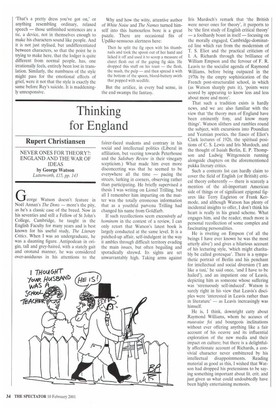Thinking for England
Rupert Christiansen
NEVER ONES FOR THEORY?: ENGLAND AND THE WAR OF IDEAS by George Watson Luttenvorth, .115, pp. 143 George Watson doesn't feature in Noel Annan's The Dons — more's the pity, as he's a classic case of the breed. Now in his seventies and still a Fellow of St John's College, Cambridge, he taught in the English Faculty for many years and is best known for his useful study, The Literaty Critics. When I was an undergraduate, he was a daunting figure. Antipodean in origin, tall and grey-haired, with a stately gait and orotund manner, he was considered over-assiduous in his attentions to the fairer-faced students and contrary in his social and intellectual politics (Liberal in affiliation, but veering towards Peterhouse and the Salisbury Review in their vinegary scepticism.) What made him even more disconcerting was that he seemed to be everywhere all the time — pacing the streets, lurking in corners, observing rather than participating. He briefly supervised a thesis I was writing on Lionel Trilling, but all I remember him imparting on the matter was the totally erroneous information that as a youthful parvenu Trilling had changed his name from Goldfarb.
If such recollections seem excessively ad hominem in the context of a review, I can only retort that Watson's latest book is largely conducted at the same level. It is a patched-up affair, self-indulgent in the way it ambles through difficult territory evading the main issues, but often beguiling and sporadically shrewd. Its sights are set unwarrantably high. Taking arms against
Iris Murdoch's remark that 'the British were never ones for theory', it purports to be 'the first study of English critical theory' — a foolhardy boast in itself — focusing on the morally engaged, Cambridge-dominated line which ran from the modernism of T. S. Eliot and the practical criticism of I. A. Richards through the brilliance of William Empson and the fervour of F. R. Leavis to the socialist agenda of Raymond Williams, before being outpaced in the 1970s by the empty sophistication of the French post-structuralist school, in which (as Watson sharply puts it), 'points were scored by appearing to know less and less about more and more'.
That such a tradition exists is hardly news, and we are also familiar with the view that the theory men of England have been eminently foxy, and know many things'. Watson slithers and rambles round the subject, with excursions into Poundian and Yeatsian poetics, the fiasco of Eliot's Clark lectures of 1926, the spiritual positions of C. S. Lewis and Iris Murdoch, and the thought of Isaiah Berlin, E. P. Thompson and Ludwig Wittgenstein running alongside chapters on the aforementioned pukka literary critics.
Such a contents list can hardly claim to cover the field of English (or British) critical theory coherently — there is scarcely a mention of the all-important American side of things or of significant epigonal figures like Terry Eagleton or Frank Kermode, and although Watson has plenty of incidental insights to offer, I don't think his heart is really in his grand scheme. What engages him, and the reader, much more is personal recollection of some complex and fascinating personalities.
He is riveting on Empson ('of all the beings I have ever known he was the most utterly alive') and gives a hilarious account of his lecturing style, 'which might charitably be called grotesque'. There is a sympathetic portrait of Berlin and his penchant for intellectual and social diversion (I am like a taxi,' he said once, 'and I have to be hailed'), and an impatient one of Leavis, depicting him as someone whose suffering was 'strenuously self-induced'. Watson is surely right in his view that Leavis's disciples were 'interested in Leavis rather than in literature' — as Leavis increasingly was himself.
He is, I think, downright catty about Raymond Williams, whom he accuses of mauvaise foi and bourgeois inclinations without ever offering anything like a fair account of his oeuvre and its influential exploration of the new media and their impact on culture; but there is a delightfully affectionate account of Richards, a convivial character never embittered by his intellectual disappointments. Reading material as good as this, I wished that Watson had dropped his pretensions to be saying something important about lit. crit. and just given us what could undoubtedly have been highly entertaining memoirs.


































































 Previous page
Previous page